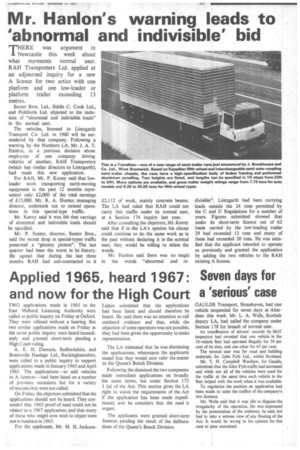Applied 1965, heard 1967 Seven days for and now for the High Court a 'serious' case
Page 91

If you've noticed an error in this article please click here to report it so we can fix it.
TWO applications made in 1965 to the East Midland Licensing Authority were called to public inquiry on Friday at Oxford. They were refused without a hearing. But two similar applications made on Friday at the same public inquiry were heard immediately and granted short-term Pending a High Court ruling.
A. E. H. Dawson, Bedfordshire, and Bramwells Haulage Ltd., Buckinghamshire, were called to a public inquiry to support applications made in January 1965 and April 1965. The applications—to add vehicles to A licences had been listed on a number of previous occasions but for a variety of reasons they were not called.
On Friday the objectors submitted that the applications should not be heard. They contended that 1965 proof of need could not be related to a 1967 application, and that many of these who might now wish to object were not in business in 1965.
For the applicants, Mr. M. H. Jackson Lipkin submitted that the applications had been listed and should therefore be heard. He said there was no intention to call outdated evidence and that, while the objection of some operators was not possible, they had been given the opportunity to make representation.
The LA intimated that he was dismissing the applications, whereupon the applicants stated that they would now refer the matter to the Queen's Bench Division.
Following the dismissal the two companies made immediate applications on broadly the same terms, but under Section 173 1 (a) of the Act. This section gives the LA right to waive the requirements of the Act if the application has been made expeditiously and he considers that the need is urgent.
The applicants were granted short-term licences pending the result of the deliberations of the Queen's Bench Division. OAULDS Transport, Stonehaven, had one vehicle suspended for seven days at Aberdeen this week. Mr. L. A. Wells, Scottish deputy LA, had called the company under Section 178 for breach of normal user.
An exaMination of drivers' records by MoT inspectors had revealed that one vehicle in the 18-vehicle fleet had operated illegally for 56 per cent of its time, and one other for 43 per cent.
The normal user was for road and building materials for John Fyfe Ltd., within Scotland.
Mr. T. H. Campbell Wardlaw, for Gaulds, submitted that the John Fyfe traffic had increased and while not all of the vehicles were used for the traffic at the same time each vehicle in the fleet helped with the work when it was available.
To regularize the position an application had been made to unite the traffics of the company's two licences.
Mr. Wells said that it was idle to disguise the irregularity of the operation. He was impressed by the presentation of the evidence, he said, but had to take a serious view of any flouting of the Act. It would be wrong in his opinion for this case to pass unnoticed.




































































































































































































































































